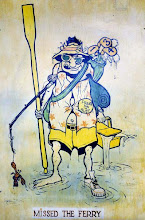I was cleaning out bookmarks in my browser today and stumbled across the link to my blog page. I clicked on it, and jeez, it's still working! Then I looked to see when my last entry was, and was shocked a bit to see that it was 8 years ago.
A lot has happened since my last post. Abby has moved to Boulder. Nat graduated from Connecticut College in 2013. I had heart surgery. The Caps won the Stanley Cup, and the Nationals won the World Series. Oh, yeah, and Donald Trump was somehow elected President of the U.S.
None of these things are connected except that they all happened and I was aware of them. This got me thinking...about time.
I work at a place where time is measured to an unbelievably high precision. Our best atomic frequency standards, aka "atomic clocks", will not vary in their stability by more than a few femtoseconds (1/1000 of a trillionth of a second) per day, yet we have no real clue as to the true nature of time itself.
People far smarter than me have pondered this conundrum throughout the course of human history. Is time pervasive throughout the universe? When we look out into space we are literally looking back in time, becasue the light we see from everything from the Moon to the most distant quasars cannot exceed c, the speed of light. In between these places we see "snapshots" of various parts of the universe seemingly frozen as moments, and from these snapshots we can interpret the birth and death of the cosmos. But that is our interpretation of the matter. Do other life forms on the planet sense time the same way we do? Are they self-aware about their relationship with time?
Our brains have evolved to a point where we see time in many guises. We can look back to the past and trace our evolution from simple organisms, and we can plan (or at least try to plan) for the future. I have always felt that this perception of time and our ability to use it as a tool is what fundamentally brought us together in communities, then cities, states, countries, empires, what one might call "civilization".
Yet each of us experiences time in a way that is unique to us as individuals. So is time a simply human construct that we have evolved to make sense of the world around us?
Eight years is a long time to pick up and begin typing words into a personal forumm such as this space, but reading back on posts from 2011 brings those experiences back as if they happened yesterday.
So if anybody is out there reading this, I'm back. Ponder the above for a few moments. And thank you for your...time.
Sunday, November 24, 2019
Subscribe to:
Posts (Atom)
